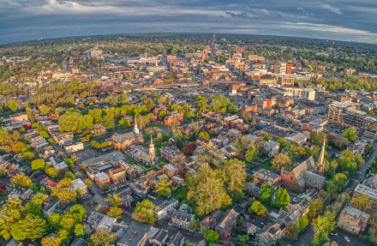This year has been one of the most challenging periods in living memory. Charities have literally been on the frontline providing support to people whose lives have been significantly disrupted by the pandemic, all the while dealing with their own devastating financial challenges.
Parts of the charity sector were disproportionately impacted by the coronavirus pandemic: demand rocketed, but income from charity shops and in-person fundraising dried up. It is the nightmare scenario. Others, such as leisure and arts, were effectively mothballed for months, and now face the prospect of needing to completely reimagine their business models.
Looking further ahead, many expect the recession to make things tough for years, not months. Charities must prepare for a public that is not less willing, but less able, to donate money.
The sector is also bracing itself for a difficult winter, as incomes continue to be squeezed, people are made redundant and demand soars.
Just this week we have heard about the “catastrophic” impact the crisis has had on Macmillan Cancer Support, which is planning 300 job cuts. And last month experts at Pro Bono Economics warned that the crisis is likely to cost the sector 60,000 jobs.
Meanwhile the Trussell Trust has warned that it expects a 61% increase in the number of food parcels it hands out compared to last year.
So, what do charities get? Another long report about the importance of communities.
Today Danny Kruger, Conservative MP, published his report entitled Levelling Up Our Communities: Proposals for a New Social Covenant.
What of the report?
Today’s report is long – over 50 pages – but that is not a surprise; the brief was wide.
It is, well, fine. No major surprises and most of the recommendations are fairly sensible. The overall tone is positive and supportive.
Charities will find it hard to argue with Kruger’s message in his covering letter to the prime minister, Boris Johnson: “We should act speedily, but collaboratively, to put communities at the centre of the national recovery and the great mission of levelling up our country.”
There is nothing especially new. Yes, the language chimes with that of the current government. For example, there’s the suggestion of a “levelling up communities” fund to align with current political trends. However, the money Kruger would like to allocate is the £2bn in dormant insurance accounts, which was long ago promised to doing good work in communities.
Other ideas, such as volunteer passports, already exist in some areas. Recommendations to make it easier for people to get involved in their communities and encourage young people to do more volunteering have been around in various guises for years.
This is not to say that these are not good ideas – they are. But one of the reasons that the same ideas keep coming up is that there has been such little progress on implementing previous well-received recommendations.
The Civil Society Strategy, which Kruger had significant involvement in producing, feels like an age ago, but is actually just two years old. This did not lead to enough action due to ministerial churn, an election, a pandemic and Brexit.
Where is the government response?
The government doesn’t seem to be helping much. It might even be actively doing harm.
On Wednesday Boris Johnson addressed the nation in a bid to get people to comply with stricter social distancing rules. No mention was made of the probable role for community volunteers in supporting people self-isolating, let alone any extra help for those organisations that coordinate such efforts.
However, there is a case for thinking that the government’s behaviour over recent weeks could make mobilising communities harder.
Johnson’s effort to shift the blame for the second wave away from government led him to encourage us to blame those who had broken the rules. The thing is that those “rule breakers” are also the very people who may need our help, or who we may need help from, in the coming months. Demonising them, and encouraging people to snitch on each other, is not likely to foster community spirit.
Then there’s the shenanigans about the timing of the publication of Kruger’s report.
To start with, the review was not announced through the normal channels – Kruger tweeted that he was doing it, sharing a screenshot of a letter from the PM. Now it has been published on Kruger's website, instead of on gov.uk as originally expected, with little by way of response from Number Ten or the Office for Civil Society.
Baroness Barran, minister for civil society, has been tasked with developing some of the ideas, particularly around volunteering. She tweeted: “Very much looking forward to helping deliver on your ideas.”
Meanwhile, a statement from the prime minister, posted with the report, outlines plans to improve access to government contracts for social enterprises (another thing that has been often called for, and again promised).
Johnson adds: “Your comprehensive and hugely ambitious report contains many exciting ideas, which are actively being considered by DCMS, and I have asked secretary of state Oliver Dowden, who is responsible for the government’s civil society agenda, to update you on the government’s work in this area in due course.”
Troubling relationship between charities and government
To be frank, it does not give the impression that this report is being taken particularly seriously by those who asked for it. Is it possible that asking for the report was a performative act designed just to look as though the government cares?
This is not the only time in recent weeks that this issue of the relationship between charities and ministers has been raised. Karl Wilding of NCVO and Debra Allcock Tyler of DSC have both spoken out recently about the challenging relationship between charities and government.
There was also a key omission from Kruger’s recommendations.
Gift Aid is mentioned just the once, and in vague terms in relation to potential changes to encourage philanthropy.
Meanwhile, hundreds of charities support a proposal made by the Charities Aid Foundation, the Charity Finance Group and the Institute of Fundraising for a temporary increase in the percentage charities can claim via Gift Aid, which could release £450m.
Was this left out because Kruger does not think it is a good idea? Or because there is no chance of it being adopted by government?
What next?
The tone, vision and general direction of today’s report is to be welcomed, but it must be the start, not the end. The lacklustre response from government remains a concern.
It is time to stop making excuses and commissioning reports, and get on with some action.
People who depend on charities deserve a sustainable and resilient sector, especially now, so it is vital that government, Kruger and sector bodies get to work on turning some of these ideas into real-world projects for communities.










